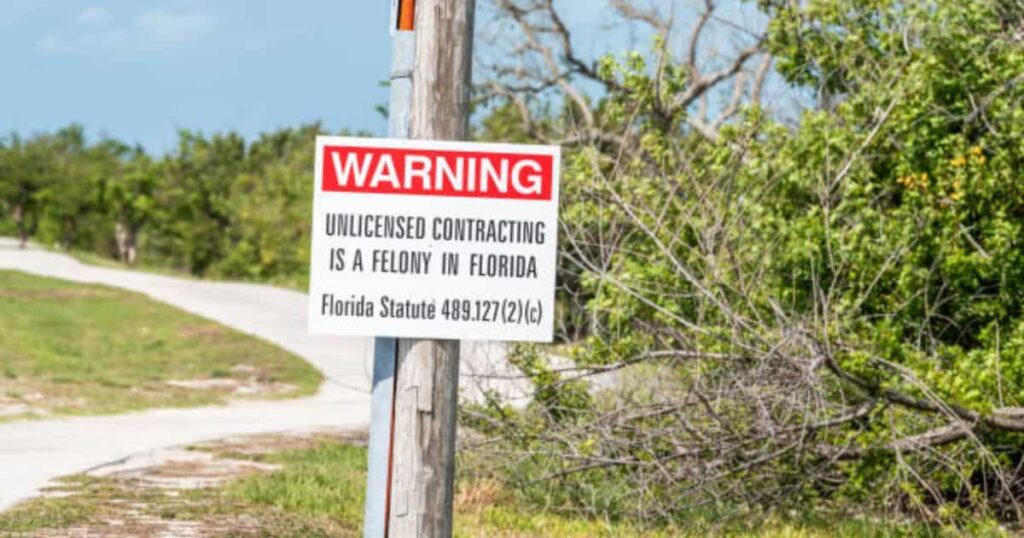In the dynamic realm of Florida’s construction industry, the presence of unlicensed contractors raises critical legal concerns. This article explores the intricacies of unlicensed contracting in the state, emphasizing the penalties associated with this violation and the available defense strategies.
Governed by Florida Statute 489.127, the consequences for operating without the requisite license are far-reaching, impacting individuals and businesses. From potential criminal charges to substantial fines, understanding the penalties is essential. Additionally, we delve into defense avenues, recognizing the importance of strategic legal representation in navigating the complexities of unlicensed contractor allegations in Florida.

Unlicensed contracting in Florida is the engaging in construction, remodeling, or repair activities without possessing the required contractor’s license as mandated by Florida Statute 489.127.
This statute outlines the legal framework governing the licensing of contractors in the state, emphasizing the necessity for individuals and businesses involved in construction-related work to obtain the appropriate licenses.
Unlicensed contracting is considered a serious violation of the law, and those found operating without the requisite license may face significant legal consequences, including criminal charges and severe penalties. Adhering to licensing requirements is crucial for maintaining the integrity of the construction industry and protecting consumers.

Contracting without a license in Florida is classified as a First Degree Misdemeanor, subjecting offenders to carry penalties of up to 1 year in jail or 12 months of probation, along with a fine of up to $1,000 for a first offense.
However, for individuals with a prior conviction of contracting without a license, the offense may escalate to a third-degree felony, potentially resulting in up to 5 years of imprisonment or 5 years of probation, coupled with a fine of up to $5,000.
Moreover, if someone undertakes contracting without a license during a State of Emergency, declared by executive order, it can also be charged as a third-degree felony.
In addition to fines and potential jail sentences, those convicted may be subject to court-ordered restitution, particularly if the alleged victim claims sub-standard work or materials caused a financial loss.

When confronted with charges of unlicensed contracting in Florida, mounting a robust defense becomes imperative. A strategic approach involves considering various defenses tailored to the specifics of each case.
One potential defense is asserting a lack of knowledge regarding the licensing requirements. It may provide grounds for a defense if the accused can demonstrate that they were unaware of the need for a contractor’s license. This defense highlights the importance of establishing the accused party’s genuine ignorance of the legal obligations.
Examining the procedures followed during the investigation and subsequent charges is another avenue for defense. If there are irregularities in the process, such as documentation errors or legal protocol deviations, these can be challenged to cast doubt on the validity of the charges.
Presenting evidence of mistaken identity is a defense strategy when there is a possibility of confusion regarding the identity of the alleged Florida unlicensed contractor. This may involve providing alibis, witnesses, or other evidence demonstrating that the accused individual or business was not involved in the alleged unlicensed contracting activity.
Challenging the accuracy of paperwork or asserting administrative errors can be a viable defense. In cases where paperwork related to licensing is not in order or contains discrepancies, it can be argued that the accused made reasonable efforts to comply but was hindered by administrative issues.
Showing a proactive effort to comply with licensing requirements, even if there were lapses, can be part of a defense strategy. This may involve demonstrating a commitment to promptly rectifying any oversights and ensuring full compliance with licensing regulations.
Our legal team thoroughly evaluates your case, determine eligibility for expungement, and expertly handles all necessary paperwork. With our extensive experience in handling similar cases, we are committed to guiding you towards the best possible outcome and renewed professional standing. So, contact us now!
The term “contracting,” particularly in the construction domain, denotes entering into agreements or arrangements to execute building, renovation, or repair activities. It encapsulates the formal commitment between parties involved in construction projects, outlining terms, responsibilities, and expectations.
In Florida, hiring an unlicensed contractor is unequivocally illegal. Property owners must diligently verify that the contractor they enlist possesses a valid contractor’s license. This imperative precaution safeguards against potential legal entanglements and ensures that the contracted work aligns with state regulations, promoting the integrity of the construction industry.
No, Florida law prohibits contractors from working under someone else’s license. Each contractor must obtain and maintain a valid license to operate legally.



